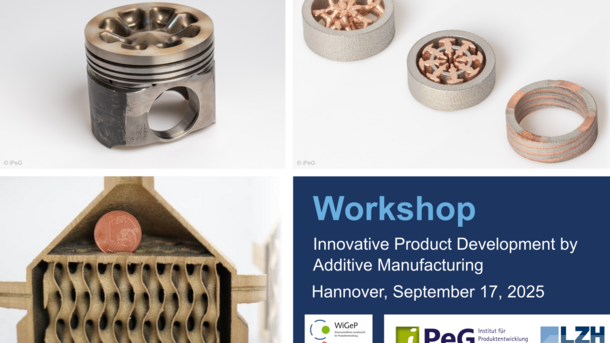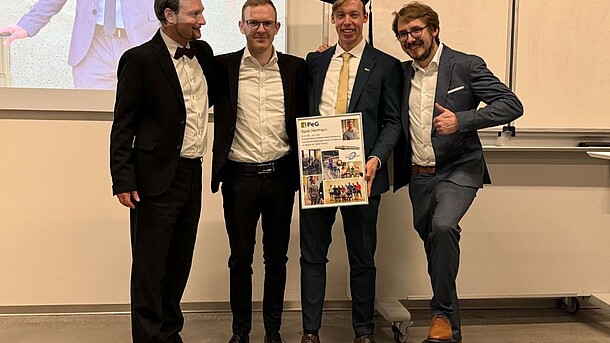The IPeG 2024
Ten years after its foundation, the IPeG and its research topics have established themselves in the German and, in some cases, international research landscape. In teaching, we are recognised as a key institute of mechanical engineering at the LUH. Building on the more than 150-year history of design chairs at the University of Hanover and, most recently, the Institute of Transmission Technology, we have restructured the institute into four departments.
Knowledge-Based Systems Engineering
The Knowledge-Based System Engineering department, headed by Dr Gembarski, focuses its research on the topics of knowledge-based engineering (KBE) and the digitalisation of lifelong learning.
Printed Effects
Under the leadership of Ms Meyer, the Printed Effects department develops highly efficient and innovative solutions, particularly in the areas of structural dynamics and thermomechanics, through our research focus "Effect Engineering" and incorporates this knowledge into teaching. The focus here is on the use of innovative large-scale equipment for laser powder bed fusion, such as multi-material production and effect integration independent of installation space. Using simulation environments such as Ansys and Abaqus, which are integrated into development environments for multi-objective optimisation, we design the highly efficient components. In addition to the design of new products, effects are implemented in the repair of high-quality capital goods using additive refurbishment.
Data Driven Design (D³)
In the Data Driven Design department, under the leadership of Ms Wurst, we conduct research into data management in the development process and specifically the feedback of field data into development under the paradigm of "technical inheritance". Further research focuses on the cost-optimised development of product service systems and scaling issues in combination with our "Generative Design Approach".
Data Management and Analytics
The Data Management and Analytics department focuses on the development of highly adaptive headlight systems and functions based on field and vehicle data. The use of innovative vehicle functions can increase comfort and safety on the road.
With the help of field and vehicle data, digital twins are created as a framework for the data management of technical systems. Data ontologies are being developed in order to standardise data collection, storage and transfer. New vehicle functions can be developed on the basis of the collected data.
Optical Systems
We are shaping the transformation of optical development and production with new manufacturing processes and development tools in order to bring customised optical systems and components into application. We achieve this by researching the potential of additive manufacturing (AM) along the process chain and the product life cycle and developing methods that enable its maximum utilisation.
We are pursuing three approaches here: In the substitution approach, additive manufacturing processes for the production of optical components are conceptualised and developed. Our focus here is on researching new process environments with which optically high-quality materials such as silicone and glass can be additively processed. In the AM design approach, we are researching new design approaches to provide solutions for optics development that utilise the geometric design freedom of additive manufacturing and take its restrictions into account. To this end, we are researching freeform optics concepts and approaches to design automation. The AM conceptual approach aims to realise new functions as well as new solutions for existing functions in the field of optics. We use additive manufacturing to develop future technologies such as contactless actuation of optical lenses and stimulated light emission in flexible waveguides.
Integrated Product Dreation
With the idea of integrated product development, we have placed our machining and additive manufacturing, assembly and testing capabilities in the context of agile development. In addition to prototyping and testing, we therefore also work on design issues and the rapid realisation of products and product service systems under the leadership of Mr Reh. In cooperation with our partners from industry and start-ups, we realise fast product development processes.





















![[Translate to English:] [Translate to English:]](/fileadmin/_processed_/e/3/csm_Promotion_Hoppe1_9df6c14c3c.jpg)


